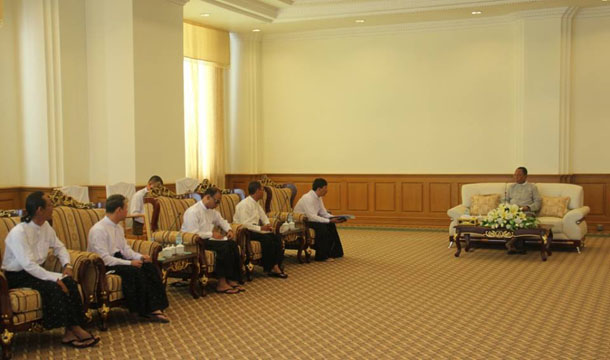RANGOON — The leaders of Burma’s most prominent student group, the 88 Generation Peace and Open Society, have held a landmark meeting with the country’s Upper House Speaker in Naypyidaw.
Pyone Cho, one of the 88 Generation activists, told the Irrawaddy that the delegation, meeting with Khin Aung Myint for the first time, discussed the importance of advancing national reconciliation and the peace process, as well as calling for the reduction of military power in political affairs during the one and a half hour discussion on Sunday.
“We discussed only these topics as we think they are the most important issues at the moment,” said Pyone Cho. “He told us there are many people who should be involved in the reform process, and that the will of other stakeholders is important as well.”
Mya Aye, another 88 Generation leader, said the activists urged Khin Aung Myint to seriously consider the need to amend Article 436, a controversial provision in the Constitution that requires more than 75 percent of the Union Parliament to approve any constitutional amendments. With a quarter of parliamentary seats reserved for the military, Article 436 effectively gives the armed forces a veto over proposals for constitutional reform.
Mya Aye also told The Irrawaddy that the delegation strongly expressed to the Speaker their desire for a durable peace agreement which would satisfy the desires of the country’s ethnic minorities.
“We told him we want a strong peace process with no backsliding that would guarantee the federal union all ethnic people here want,” Mya Aye said.
Discussing recent proposals for 12-party talks between representatives of the government, military and opposition—which themselves grew out of earlier agitation for a six-party dialogue—Pyone Cho said that there was broad agreement between Khin Aung Myint and the 88 Generation leaders that peace and reform discussions should focus more on outcomes than ensuring every sectional interest seeking representation had a seat at the table.
“[The Speaker] said it’s more important to have a concrete agenda to discuss at the talks rather than the number of people involved,” said Pyone Cho.
Many members of the 88 Generation Students played a crucial role in organizing the 1988 pro-democracy uprising and were subsequently imprisoned under the former military regime.
Members of the pro-democracy group have over the last two years held talks with the government’s chief peace negotiator, Minister Aung Min, Union Parliament Speaker Shwe Mann and President Thein Sein on issues related to the release of political prisoners and ongoing efforts to reach a nationwide ceasefire agreement.
Last year, the ’88 Students also joined forces with the National League for Democracy to campaign for changes to the military-drafted 2008 Constitution before the 2015 general election, declaring that they would prioritize reform to Article 436.

















